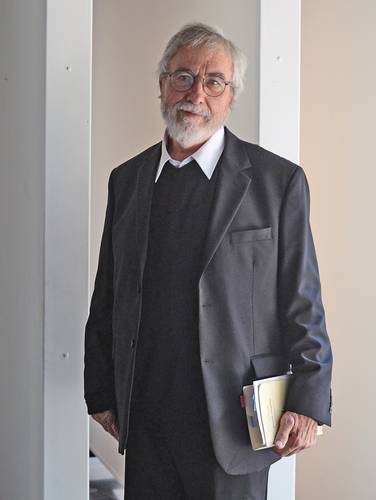The author of barefoot days y shadow balance He is recognized by specialists, colleagues and friends as one of the most important Mexican poets of the 20th century.Photo Federal Ministry of Culture
The poet and essayist Antonio Deltoro (1947-2023) passed away last Sunday at his home. The Foundation for Mexican Letters had scheduled a tribute this Tuesday at the Casa Universitaria del Libro, regarding his 76th birthday, which he turned on May 20; the tribute will now be posthumous.
Considered discreet and generous, Deltoro is recognized by specialists, colleagues and friends as one of the most important Mexican poets of the 20th century.
A close relative of the teacher told The Conference who died on Sunday at 6:30 p.m. at home, due to respiratory arrest, due to chronic problems after a fall he suffered five years ago, an accident that over time worsened his condition
.
The son of exiled Spanish Republicans, he was born in Mexico City on May 20, 1947. He was a member of the National System of Art Creators on several occasions since 1993 and emeritus since 2019. He taught poetry courses and workshops at the Octavio Paz Foundation, The House of the Poet and the Foundation for Mexican Letters, as well as in institutions and houses of culture in various Mexican cities and other countries.
He was cultural coordinator of the Ramon Lopez Velarde Poet House (2001-2007) and poetry tutor at the Foundation for Mexican Letters (2007-2018). He received the Aguascalientes Fine Arts Poetry Award for the book shadow balance, in 1996, and the magazine Award Vice versa for the best Mexican book of poetry in 1997, among other distinctions and awards.
He is the author, among other poems, of Inorganic hubbub, Where is this to?, The barefoot days, Balance of shadows, Poems on a scale, Poetry gathered, Lefty, The still y The trees that will populate the Arctic. His poems have been translated into French, English, Romanian, Polish, Japanese, Portuguese, Italian, Chinese, Greek, and Dutch.
On social networks, friends and colleagues mourned the death of the winner of the Novi Sad International Poetry Prize (Serbia, 2014) and the Carlos Pellicer Ibero-American Fine Arts Poetry Prize for work published in 2013.
Antonio Deltoro also published in cultural supplements and magazines such as La Jornada Semanal, Vuelta, University Magazine (UNAM), House of Time (UAM), Luvina (University of Guadalajara), Gazette of the Economic Culture Fund y Library of Mexico, The Weekly News, as well as in publications from other cities and countries such as Hostos Review (Boston), Sibyl (Sevilla), literary paper (Caracas), untimely (Medellín), palimpsest (also from Seville), Bulletin of the Federico García Lorca Foundation (Grenada) and Poetry Ireland Review (Dublin).
In search of the aesthetics of the word
In the statement to announce the tribute, the Foundation for Mexican Letters shared memories of the poet Ángel Leyva: Deltoro he studied economics, practiced it and gave classes; however, she opted for poetry. He also tried to study physics, but as Deltoro himself commented, he discovered that he was actually interested in the poetry of physics.
.
Economists, Leyva added, “have to do with language, since poetry is economics; language economy. I believe that this discipline has to do with an ideal of equity, justice, distribution, well-being; it has to do with relieving the pain of lack, and all this knowledge is part of the exercise of language, of the search for poetry, of that aesthetic notion of the word.
Hence, what stands out in Deltoro’s poetry is a sentimental economy. An elaboration of objects, verbal instruments, to generate this flow where we see a metaphor, a metonymy. Objects acquire the meaning of that relationship with people; tools, toys or utensils that make up our world, our scenery, but also the props with which we identify with other people, with the other, with the world around us. There is an economy there, and in it, the name of things is more important than the adjective of things.
his poetry is not of experimentation, nor of jumps; it is more a poetry of economy and precision, assertive and transparent
Leyva stressed.
Regarding the legacy that Deltoro leaves to the new generations of poets, Leyva commented that it is freedom. Not looking for followers to imitate him, but rather to recognize his teaching, as someone who has brought freedom of thought and creation
.
The tribute is scheduled for the participation of the poet Claudia Berrueto, the editor Pablo Molinet, the essayist Christian Peña and the narrator and screenwriter Javier Peñalosa.
Elisa Díaz Castelo, who will also participate in the posthumous tribute, recalled that Deltoro says in one of his poems: I did nothing extraordinary, / but the extraordinary visited me / almost every night
.
Antonio taught me that poetry is that: knowing how to recognize the extraordinary, that humble miracle that is hidden behind the daily routine, under a stone or around the corner.
Diaz Castelo said.
The posthumous ceremony in honor of the poet will be held at the Casa Universitaria del Libro (closed at Orizaba 24, Roma Norte) at 5:00 p.m.
Song
you have to get closer
if he loves you;
you have to separate
if he hates you,
but the worst
is the dryness
Of the sand.
Your love is a fish in water
his life, a tide
that welcomes you
and leaves you
in the sand,
alone, expectant,
beyond the waters
By Antonio Deltoro, taken from The trees that will populate the Arctic (Era, 2012)
